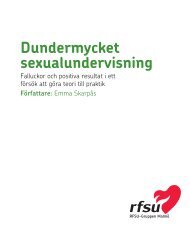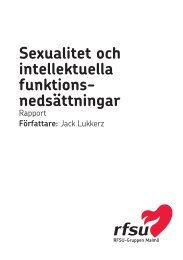Download pdf - RFSU
Download pdf - RFSU
Download pdf - RFSU
Create successful ePaper yourself
Turn your PDF publications into a flip-book with our unique Google optimized e-Paper software.
experienced that drives them to this meeting, which at<br />
the same time is a non-meeting.<br />
Regulation of closeness and distance<br />
On the one hand, it may seem paradoxical that people who<br />
have sex with strangers are so afraid of letting someone<br />
enter their inner world. On the other hand, it may seem<br />
completely obvious. What is being avoided in both the<br />
act of prostitution, as well as clients’ ambivalence to treatment,<br />
centres around the threat of becoming involved in<br />
a relationship characterised by mutual understanding and<br />
the recognition of another human being. The other cannot<br />
be allowed to become an independent person in their own<br />
right, someone who awakens feelings or desires. Instead<br />
the other must remain anonymous in order to fulfil their<br />
function as fantasy objects. Therefore, the question of who<br />
is in control of whom becomes central.<br />
In order to regulate a necessary distance for prostitution<br />
to take place money plays an important role. Money<br />
is part of a “contract” that assures both parties that what<br />
is happening is purely a “business transaction” and nothing<br />
more intimate or demanding. The fact that money<br />
separates the two participants, engenders fantasising in<br />
both parties.<br />
Among the men, pornographic consumption and the<br />
purchase of sex seemed to function as a secret room to<br />
which their partner was never admitted. At home in this<br />
room they could preserve a sense of autonomy and protect<br />
themselves from feeling exposed or overwhelmed by too<br />
much closeness.<br />
However, we discovered that there was another important<br />
psychological driving force behind the purchasing<br />
and selling of sex. Something was making these men<br />
and women repeatedly return to a situation that was not<br />
fulfilling their fantasies.<br />
On the contrary, they were repeatedly being thrown<br />
back into feelings of anxiety and self-hate. Neither the<br />
women nor the men seemed to fully appreciate this. It is<br />
as if they were being driven by a power beyond their ken,<br />
something that forced them to abandon a conscious desire<br />
to abstain from buying and selling sex. We will now try to<br />
present some reflections on this force and how it relates<br />
to other important psychological aspects of prostitution.<br />
Acting instead of thinking<br />
From a very early age we gradually learn to think and experience<br />
within the framework of relationships to those that<br />
we are closest to. In the infant’s chaotic world experiences<br />
of hunger, tiredness, pain, joy, wellbeing, love and hate<br />
gradually become both integrated and differentiated help<br />
from the parents’ ability to attune to the infant’s expressions<br />
of these feelings. By interpreting and thinking about<br />
what the infant is expressing, the infant gradually comes<br />
to differentiate between inner and outer experience. An<br />
important tool in this process is the development of language,<br />
which lays the groundwork for communication and<br />
our ability to think about both others and ourselves.<br />
If the infant is not being adequately attuned to (for<br />
example, due to the a parent being too focused on his/her<br />
own needs, or if the infant is exposed to overwhelming<br />
experiences that the parent fails to appreciate) these experiences<br />
may remain undifferentiated and unintergrated.<br />
As a result it will be difficult to think about and relate to<br />
these experiences.<br />
Moreover, if a parent uses the child to satisfy his/her<br />
own needs, it will impede the child’s development of<br />
21

















